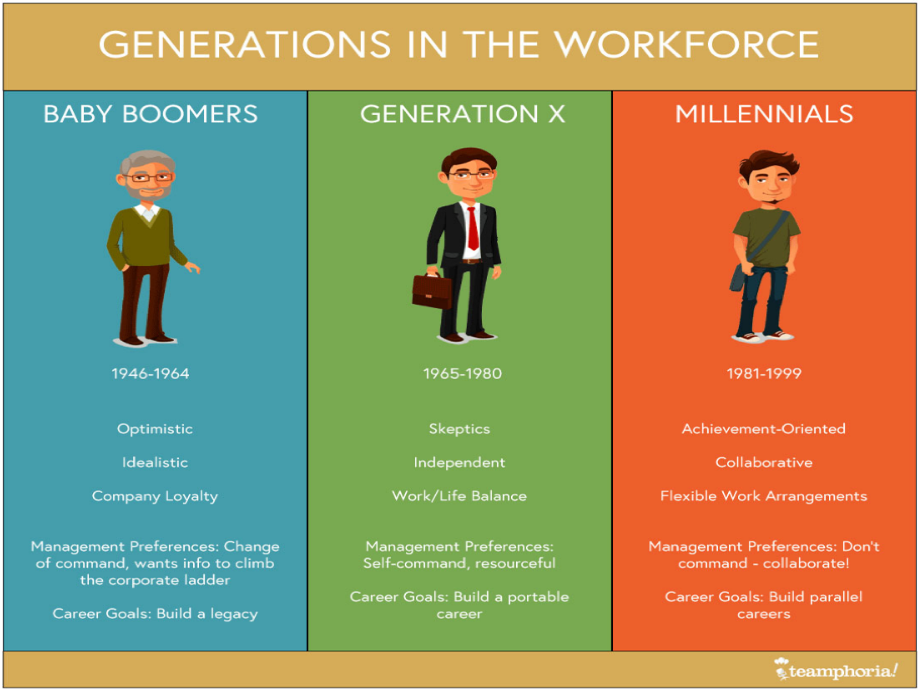Talkin’ ’bout my intergenerational business II

Independent Contributor
Intergenerational Business 2
Following on from Intergenerational Business 1 this article looks at Baby Boomers and Gen X in the workforce. Traditionalists are now in their 80’s and not so dominant in the workforce anymore, their stories are incredible, and much can be learnt as we basically changed from horses and candles to cars and electricity in their lifetime. So we will start with the Boomers and Gen X in this article.
Getting to Know the Baby Boomers in the Workforce
Baby boomers came into the world between 1946 and 1964. This means they are the men and women who are now aged 59 to 78. They are the dominant generation in the higher ranks of the corporate ladder and they own many of the successful businesses today. Boomers grew up alongside an economic boom following the war. Because of this, they witnessed a plethora of huge developments in technology, society and business during the time considered by many to be the golden years.
Characteristics of Baby Boomers
The first step to understanding baby boomers is to know the typical characteristics that the majority of people in this generation share.
Competitive
The global population rose considerably with the arrival of the baby boomers. As to be expected, this led to more crowded schools and tougher competition for jobs. Boomers quickly learned that in order to succeed, they have to maintain an edge over their peers. Thus, they developed a fiercely competitive nature that proved to be very useful later on in life, especially in business.
Boomers do not necessarily adapt well to flexible work setups. They strongly believe in the hierarchical structure and often aim for promotions to a higher position because they believe that this is an accurate measure for success.
Independent and Self-Reliant
Because of the significant changes that they have witnessed growing up, and seeing the many possibilities around them, boomers developed a strong sense of independence and self-reliance. They do not back away from challenges and confidently subscribe to the ideal that they can change anything if they set their mind to it.
Hard-working
Boomers are highly motivated and extremely focused on work. They take pride in working long hours sometimes to the point of sacrificing family time and leisure hours. They believe that this is the best way to achieve success and career growth. Thus they also became known as the workaholic generation.
This particular quality of boomers is one of the major areas of contention between them and the younger generations who, according to boomers, do not have a decent work ethic and are even downright lazy.
Clash with Other Generations
When it comes to passing on the family business to the next generation, many boomers experience a lot of frustration. The same is true when they are forced to work with Gen X people or millennials in the workplace.
Boomers believe that Gen X people do not have company loyalty because of the way they quickly switch jobs when a better opportunity comes up elsewhere. They also think millennials are not pulling their weight in the workplace. They even have issues with traditionalists who, despite having a great work ethic, seem to be out of touch with current times.
Does this mean that boomers are difficult to work with? Not necessarily, and not any more so than other generations. Once you understand what they value and what drives them, as well as respect their experience, baby boomers can certainly contribute greatly to the overall success of a business or organisation.
Getting to Know the Generation X in the Workforce
Born between 1965 and 1979, the so-called Generation X or Gen X grew up in smaller families that were quite well-to-do and able to provide all the comforts that a child of those times would need.
Characteristics of Generation X
They are not as spoilt as the younger generations but are also not as riddled by difficulties as the older ones. Here are some of the typical characteristics of the members of this generation.
Carefree
They enjoyed quite a lot of freedom growing up, playing in the streets until twilight because it was safe enough and parents were not worried. They played in puddles, climbed trees, endured bullying and caning in school, and turned out quite alright.
Independent
It was typical to grow up in a household where both parents worked so Gen X kids were usually left by themselves. This gave them a stronger sense of independence that made them highly capable of successfully setting up their own business or pursuing a career with great focus and motivation.
Defiant against Authority
Since they were often left to their own devices, this gave Gen Xers the impression that they were somehow above the rules. Many of them exhibit some level of defiance against authority and lack of regard for norms and conventions.
Attitude towards Work
Gen X people have more opportunities to interact with the world through travel. This allowed them to experience a wide range of cultures on a first-hand basis. Whilst boomers typically lived to work, Gen Xers started the work to live concept, taking more time for recreation and enjoying life.
In contrast to the typical work objective of previous generations of securing a stable position and staying loyal to one company, Gen Xers switch jobs each time they see a better opportunity. This is their way of acquiring skills and building a more impressive resume. However, they are not as restless as the millennials who sometimes stay at jobs for just a few months at a time before moving on to what they believe are greener pastures.
One of the most valuable contributions of Gen Xers in the workplace is their ability to combine compassion with realism. This makes them the easiest generation for everyone else to get along with. Also, Gen Xers have the advantage of experiencing a little bit of what the other generations have. To an extent, they have still inherited the work ethic of the traditionalists. At the same time, they are also able to easily adjust to the introduction of digital technology, allowing them to connect easily with younger generations.
The next article Intergenerational Business 3 discusses Millennials and Gen Z in the workforce.
Intergenerational Business 4 suggests strategies or learnings to manage or avoid Intergenerational Conflict in business.
Intergenerational Business 5 looks at real leadership.
Intergenerational Business 6 pulls 1-5 together to discuss real examples of Intergenerational Sustainable Farm Business Transition.

